Arts & Culture
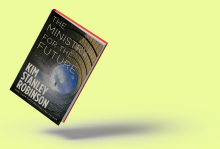
IT BEGINS IN the way the 2020s could end: with a climate change-driven heat wave that kills 20 million people in India. Kim Stanley Robinson’s work of science fiction is heavy on the science and light on the fiction. Indeed, the “fiction” of this novel reads more prophetic than futuristic. Just like biblical prophets, Robinson is less interested in predicting a far-off world than seeing our current world for what it is. The words of the prophet Jeremiah would fit snugly in this book: “Disaster overtakes disaster, the whole land is laid waste” (4:20).
Robinson’s vision of a response to climate change veers on the edge of technological utopianism without ever falling into the abyss. The airships, cryptocurrencies, and drones of Robinson’s novel are not simply fantastic simulations of a utopian (or dystopian) world. They are pragmatic responses to a world that is burning and melting under our feet. While the need for technological solutions is so apparent in Ministry (and in our own world), Robinson’s hope is not located in technology. Rather, the tentative hope of Ministry is found in the unwavering humanity of its many heroes.
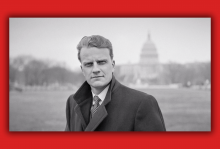
THE TWO-HOUR PBS documentary Billy Graham ran as part of the “American Experience” series, but it could have been subtitled “An American Tragedy.”
The story Billy Graham tells is mostly one of triumph. A boy grows up on a North Carolina dairy farm, becomes the top Fuller Brush salesman in a two-state territory, then answers a call to preach. His crusades attract more than 200 million people and change hundreds of thousands of lives. However, like all the tragic heroes before him, Billy Graham had a flaw. It was neither lust nor greed, the nemeses of so many evangelists. Instead, as one of the commentators in the documentary tells us, Graham was drawn to power “like a moth to a flame.”
In the 1940s Graham led a movement that dragged evangelical Christianity out of the cultural backwoods and into the mainstream of postwar American life. Graham’s early years provide a road map of that movement as he went from ultra-sectarian Bob Jones University to Florida Bible Institute to Wheaton College. He worked as a staff preacher with Youth for Christ, then began a series of independent evangelistic crusades that started in a tent off Hollywood Boulevard in 1949 and culminated, in 1957, with a 16-week run at Madison Square Garden.
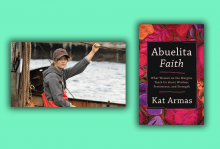
Ruby's Refrain
Siân Heder’s heartwarming feature film Coda captures the love and struggles of a deaf household and their family business. As a CODA (child of deaf adults) and the only hearing person in her family of four, 17-year-old Ruby faces a dilemma when she discovers her talent for singing. Pathé.
Sally’s Story
In Affirming: A Memoir of Faith, Sexuality, and Staying in the Church, Sally Gary shares her journey through isolation and profound community as she opens fruitful conversations on sexuality and following Christ. Eerdmans.
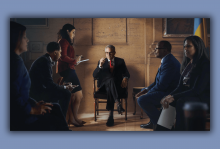
PENNSYLVANIA CAPTURED THE attention of many of us this year via the superb crime drama Mare of Easttown on HBO, but there’s another incredible television show set in the state that we should be watching. I’m talking about Philly D.A., on PBS. An eight-episode documentary series focused on activist-attorney Larry Krasner’s unusual election to the role of Philadelphia’s district attorney and his desire to drastically reform the office, Philly D.A. is gripping and revelatory in how it explores the intricacies of his efforts. In the social justice sphere, we have big ideas of how government systems and traditions can be altered and abandoned, but most of us never get the chance to implement them. Philly D.A. depicts a staff doing just that and shows how difficult it is.
We see assistant DAs and staff members who have worked in the office for years, for several administrations, and have households and families—we see them be fired because they’re believed to be too entrenched in how things were done in the past. We see surviving loved ones of murdered citizens wonder why, after many years of the DA’s office recommending the death penalty, Krasner does not see it as a good solution. We see judges and other officials express their fear that, in the pursuit of innovation, all aspects of a functioning system are being tampered with, negatively affecting the city’s safety.
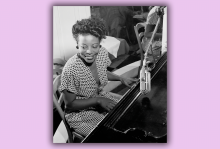
FROM THE 1920s until her death in 1981, Black jazz pianist and composer Mary Lou Williams injected energy and innovation into the genre and, via three jazz Masses composed after her conversion to Catholicism in the 1950s, into the church. Still, her music is sometimes overlooked, while the popularity of male jazz musicians’ work—including her mentees Thelonious Monk and Charlie Parker—persists.
In this century, Deanna Witkowski is amplifying Williams’ works of music and faith. Witkowski is a jazz pianist herself, inspired by Williams, and a doctoral student in the jazz studies program at the University of Pittsburgh. She is restoring and recording general and liturgical compositions by Williams, some of which haven’t been recorded since 1944. And she has written a biography of the pioneer, Mary Lou Williams: Music for the Soul (Liturgical Press). Witkowski spoke with Sojourners associate editor Da’Shawn Mosley about the book and its namesake.
Da’Shawn Mosley: How did you become interested enough in Mary Lou Williams to write a biography of her?
Deanna Witkowski: In 2000, Dr. Billy Taylor, a jazz musician himself and the judge from a jazz piano competition I had played the year before, contacted me and said, “Come bring your quintet to play at the Mary Lou Williams Women in Jazz Festival at the Kennedy Center in the spring.” And so of course I said, “Yes, I would love to do this.” And then thought, “I really don’t know Mary Lou Williams’ music.” That’s a very common thing, even among jazz musicians or aficionados. She has this reputation [as] this great pianist and composer who wrote big-band music for Duke Ellington and Benny Goodman and mentored all these famous jazz musicians—so we know Thelonious Monk. But her compositions aren’t very well known.

The actor and activist talks with Sojourners about faith, service, and his new film ‘12 Mighty Orphans.’

The God presentented in the new children’s book What Is God Like? is a shapeshifter. Matthew Paul Turner and the late Rachel Held Evans, with the help of Ying Hui Tan’s vibrant illustrations, depict God as a woman, a shepherd, a gardener, and even as a blanket fort.
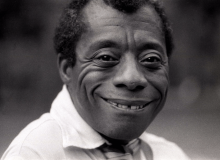
I read a lot of news this week, and Baldwin had something to say about all of it.

Allow us to steal a few minutes of your attention for stories that will steal your heart.
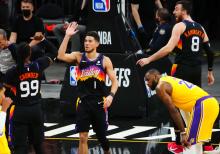
More than usual this past week, I've needed small reminders about the possibility of justice. Why? Well, this week is the week of the 100th anniversary of the Tulsa Race Massacre.

I am no stranger to the ways that sports is often derided in faith and justice circles. But I contend that sports and competition offer valuable insights into what it means to be human.
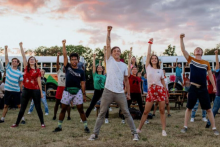
Despite all the outsized power and privilege white evangelical communities hold, there is a dearth of spaces where people can process what it means to have grown up in the belly of it. Fortunately, there’s a whole slew of new films and documentaries that focus on white evangelical youth culture, offering some of us the chance to reflect on our upbringings as we figure out what it means to have white evangelical roots in a post-Trump world.
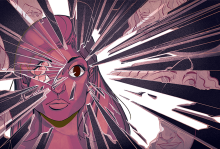
We wander round searching for demons
and making them of each other
when we find none. Out of feigned necessity,
the slightest difference becomes a reason
to tame—to vanquish—to stamp out until
we look up and catch sight of ourselves:

Shannon Dingle is a disabled activist, sex trafficking survivor, and author of recently released Living Brave. Her family’s grief over the sudden death of her husband, Lee, in July 2019 resonated with many worldwide. She discussed Living Brave with Liuan Huska, author of Hurting Yet Whole: Reconciling Body and Spirit in Chronic Pain and Illness.
LIUAN HUSKA: IT’S been almost two years since a rogue wave killed your husband, Lee, on a family beach vacation. You wrote about his death soon after it happened.
Shannon Dingle: Looking back on some of my writing, I’m so damn proud of my ability to capture where I was then. It is a record for me and my kids as much as for anyone else. I wanted to tell the story and protect how it was told.
Did the sexual abuse you experienced as a child influence how you wanted to tell your grief story? My brutal and raw honesty definitely comes from a place where I had horrific things happening that I couldn’t tell. I know how freeing it can be to put words to things. I write from a place where I know I’m the authority on what my life has been and what happened.
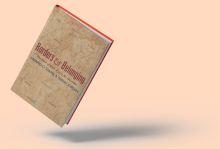
WE ARE LIVING in shouty times. The pandemic has raised the decibels of public debate, as we bellow and bark at each other across social media. And while we initially may have imagined that the coronavirus would bring us together—and in some ways it has—in many ways our civic life has only become more fractured and fragile. The murder of George Floyd last year unleashed a well of public grief and a wave of protests that revealed a widening political divide in the U.S., as did the Jan. 6 riot at the U.S. Capitol. And now vitriol over vaccines from an anti-science contingent threatens the hope of achieving herd immunity.
Perhaps, amid all this noise and tumult, the quiet biblical Book of Ruth has something powerful and profound to say, some reassuring balm and redemptive truth to offer our polarized world. Indeed, in the skilled hands of gifted poet Pádraig Ó Tuama and the late theologian Glenn Jordan, it is made new for our times. In Borders and Belonging, these two Irish men orbit the ancient narrative of a Moabite woman and her Jewish family, asking how “this apparently simple book situates itself at the very places where the tectonic plates of conflicted communities threaten to crack and split apart whole nations and societies.” With an eye to how Brexit-related tensions in Ireland threaten to reignite old conflicts and destroy a delicate peace, and as white nationalism gives rise to horrors in the U.S., Ó Tuama and Jordan explore the Book of Ruth’s extraordinary capacity to move us toward a different way of being in relation to one another, suggesting that “it offers us a way towards the healing of our fractures and the building of new and healthy relationships in the aftermath of trauma.”
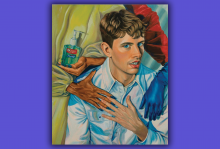
A FEW WEEKS ago, a friend invited me to New York with them to see some art. After taking the commuter train down from New Haven, Conn., we made our way through Grand Central Station, onto the subway, then up a steep escalator, eventually arriving at the gallery’s entrance.
Visiting Manhattan during a pandemic is a fascinating study in strangeness. The Times Square subway station is so quiet you can hear your own footsteps. Sweaty players duel on a basketball court, and I am shocked by seeing unmasked faces in public. Even the experience of gallery hopping, one that used to be extremely familiar to me, feels askew. A few of the places we visit require a signed liability waiver before entering. Each desk is punctuated by a giant bottle of hand sanitizer. This imposing combination does not stop me from enjoying the work I see, however. There are many juxtapositions of color and line that sparkle in my brain. An image of a fabric store, itself made out of fabric, proves especially delightful. I see some art books that I think I might like to have in my home. I am glad to have gone.

‘I Finally See’
Prerelease tracks “Church Girl” and “Safe Passage” pave the way for British singer-songwriter Laura Mvula’s forthcoming album Pink Noise. The former gospel choir member brings introspection and the ’80s sounds of her youth to her third record, perfect for dancing. Atlantic Records.
A Common Thread
Muslim American Writers at Home: Stories, Essays and Poems of Identity, Diversity and Belonging gathers a range of Muslim identity and experience in the U.S. and Canada. Authors in the anthology share dreams and memories, shatter stereotypes, and speak to one another. Freedom Voices.
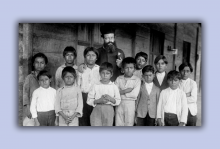
IN 2016, RAOUL PECK'S documentary I Am Not Your Negro used the life and work of James Baldwin to explore the underlying truths of racism in U.S. society. Peck said that after making that film, “Baldwin had firebombed every known field of bigotry I knew and annihilated any attempt at deniability of the racist monster that lurks in corners of our societies.”
Processing that experience led Peck to his new, ambitious HBO documentary series Exterminate All the Brutes. In it, Peck expands on the themes of ignorance and resistance in our modern-day understanding of racism and on how our flawed historical understanding feeds those attitudes. Exterminate All the Brutes is also an essay film, with Peck, a Haitian immigrant, reflecting on his identity as a Black man who has lived in a variety of cultures and how that’s influenced his own art.
The series weaves voiceover and scripted dramatic scenes with information from groundbreaking works on European colonialism, Indigenous peoples, and racism—including Roxanne Dunbar-Ortiz’s An Indigenous People’s History of the United States, Michel-Rolph Trouillot’s Silencing the Past, and Sven Lindqvist’s Exterminate All the Brutes.

ON HIS DEBUT record, Palisade, released in 2012, Americana wunderkind Parker Millsap ends the title track singing with blues-soaked vocals, “Writing on a blank white page keeps my demons one more day away.” For Millsap, an Oklahoma native who now calls Nashville home, those lyrics weren’t just a young artist trying to sound profound; they spoke truth to his experience with music and faith.
“When I’m playing [music] with other people and for other people, there is something about it that will always feel spiritual to me,” says Millsap. “After all, that spiritual feeling, that’s the context I first received music in.”
Millsap grew up in a Pentecostal church in a small Oklahoma town, and says if people were going to speak in tongues or run around the sanctuary, it was almost always during the music. “I always resonated with using music to reach ecstatic states,” he says. “As soon as I could play enough chords to keep up, they put me down in front at church.”
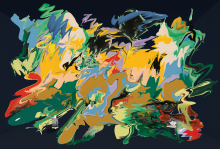
OFTEN, WITH MEDITATION, I’m reminded of many people’s reaction to poetry. “I don’t get it,” they say, a little embarrassed to be admitting this to a writer and a former English teacher.
The first thing I think is: You must have had a really lousy teacher who taught you that poetry is something you “get”—a message you extract for a good grade. Poetry-phobes might feel a bit more relaxed when I tell them that’s not how poetry works. Often, with my favorite poems, I never fully get them. All I know is that reading and rereading them, the mystery stirs inside me again. In her lovely poem “Self-Portrait with Religion and Poetry,” Kate Daniels describes what happens to her when she deeply connects with a work of art:
... I lie down in the silence
of my mind and touch the world all over.
Clouds fly through me. Trees break the sky
above a frozen lake, and a footprint
startles its crust of snow.
Then I can type another page, or nurse
my hungry infant. I can take from the cupboard
the bread and the wine, the eggplant and garlic
my hands will transform into sustenance.